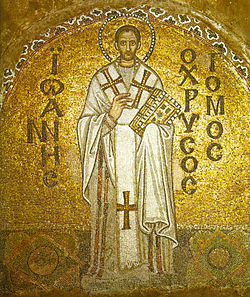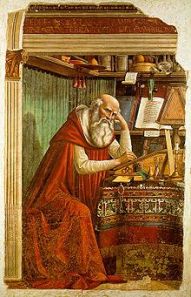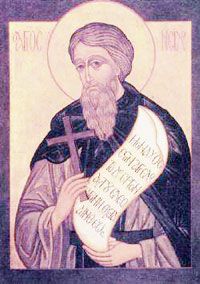http://deovivendiperchristum.wordpress.com/2013/09/26/john-chrysostom-c-347-407-jerome-c-347-420-marius-victorinus-4th-century-and-fulgentius-of-ruspe-c-465-533-on-ephesians-14-6/
John Chrysostom (c. 347-407), Jerome (c. 347-420), Marius Victorinus (4th century) and Fulgentius of Ruspe (c. 465-533) on Ephesians 1:4-6

“What he means [with 'he hath chosen us in him'] is this: The one through whom he has blessed us is the one through whom he has elected us… Christ chose us to have faith in him before we came into being, indeed even before the world was founded. The word ‘foundation’ was well chosen, to indicate that it was laid down from some great height. For great and ineffable is the height of God, not in a particular place but rather in his remoteness [i.e. transcendence] from nature. So great is the distance between creature and Creator.”
“’You have been elected’, he says, ‘in order to be holy and unblemished before his face’… He himself has made us saints, but we are called to remain saints. A saint is one who lives in faith, is unblemished and leads a blameless life.”
“…to become virtuous and to believe and to advance, this too was the work of the One who called us…”
“So that our love for him may become more fervent, he desires nothing from us except our salvation. He does not need our service or anything else but does everything for this end. One who openly expresses praise and wonder at God’s grace will be more eager and zealous.”
- John Chrysostom (c. 347-407), Homily on Ephesians, 1.1.4, 5, 6.

“It is asked how anyone can be saintly and unblemished in God’s sight… We must reply [that] Paul does not say he chose us before the foundation of the world on account of our being saintly and unblemished. He chose us that we might become saintly and unblemished, that is, that we who were not formerly saintly and unblemished should subsequently be so… So understood it provides a counter-argument to one who says that souls were elected before the world came to be because of their sanctity and freedom from any sinful vice.”
- Jerome (c. 347-420), Epistle to the Ephesians, 1.1.4.

“God in his love has predestined us to adoption through Christ. How could God possibly have Christ for his Son by adoption?… We speak of ourselves as heirs of God the Father and heirs through Christ, being sons through adoption. Christ is his Son, through whom it is brought about that we become sons and fellow heirs in Christ.”
- Marius Victorinus (4th century), Against the Arians, I.2.
“We, being such as we are, are surrounded and held fast by vice and libidinous sin. When we are set free by him, acquitted of sin and pardoned for our sins, we are also adopted as his sons. All this is therefore to the praise of his glory and grace – his glory because he can do so much, and his grace because he offers this to us freely.”
- Marius Victorinus (4th century), Epistle to the Ephesians, I.I. (4) 5-6.
For the rest, see: http://deovivendiperchristum.wordpress.com/2013/09/26/john-chrysostom-c-347-407-jerome-c-347-420-marius-victorinus-4th-century-and-fulgentius-of-ruspe-c-465-533-on-ephesians-14-6/

No comments:
Post a Comment